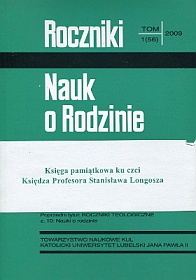Analysis of Narcissistic Features Defined in the Context of Selected Family Factors inWomen with Feeding Disturbances
Abstract
The aim of the paper was to search for differences between women with feeding disturbances and healthy women concerning the parents' educational attitudes and intensity of narcissism, as well as to reveal the dependencies between perception of educational attitudes in patients and their narcissistic features.
168 female subjects were studied who were diagnosed as having feeding disturbances, and 168 healthy ones. The average age of women in both groups (clinical and control ones) was 17.5 years, the average age when the disturbed women developed their illness was 16.2 years, and the average time the illness lasted was 4.1 years. In the study the following psychological tests were used:
The Deneke, Hilgenstock, Muller Narcissism Inventory translated into Polish and edited by Januszewski, on whose basis narcissistic features were defined in the subjects, and the Parent Children Relations Questionnaire compiled by Roe and Siegelman and edited in Polish by Kowalski, used for assessing the subjects' fathers and mothers' educational attitudes.
The results of the statistical analyses were the basis for formulating the following conclusions:
- The educational attitudes that best differentiate women with feeding disturbances from healthy women is their mothers' hostile, rejecting attitude and lack of their fathers' acceptance and support experienced by the subjects.
- Women with feeding disturbances are characterized by a more negative – than in healthy women – attitude towards their own body, greater helplessness, feeling of being worthless, of lack of meaning of life, and a fear of a negative appraisal made by others.
- Their fathers' exacting and rejecting attitude experienced by women with feeding disturbances occurs alongside with an intensified sense of lack of meaning of life, impulsiveness, a negative appraisal of their own bodies, a fear of a negative appraisal made by others, a tendency to escape from reality into daydreaming, and aspiring to self-sufficiency.
References
Bruch H.: The Changing Picture of Illness: Anorexia Nervosa in Treatment and the Therapeutic Process, Madison: International University Press 1987.
Deneke F. W., Hilgenstock B.: Organisationsformen und Regulationsweisen des Selbstsystems, „Zeitschrift für Psychosomatische Medizin und Psychoanalyse” 34(1988), z. 2, s. 178-195.
Deneke F. W., Hilgenstock B.: Das Narziβmusinventar, Bern–Stuttgart–Toronto: Huber 1989.
Diagnostic and Statistical Manual of Mental Disorders, DSM-IV, Washington, DC: American Psychiatric Association 1994.
Drozdowski P.: Wskazania do psychodynamicznej terapii zaburzeń odżywiania się, [w:] Leczenie anoreksji i bulimii psychicznej: co, kiedy, komu, red. J.Bomba, B. Józefik, Kraków: Biblioteka Psychiatrii Polskiej 2003, s. 55-61.
Esparon J., Yellowlees A.: Perceived Parental Reading Practices and Eating Disorders, „British Review of Bulimia and Anorexia Nervosa” 6(1992), z.1, s. 39-45.
Januszewski A.: Kwestionariusz Narcyzmu. Wartość diagnostyczna wświetle wyników badań polskiej młodzieży, [w:] Wybrane zagadnienia z psychologii klinicznej i osobowości. Metody diagnostyczne w badaniach dzieci i młodzieży, red. P.Oleś, Lublin: Towarzystwo Naukowe KUL 2005, s. 153-196.
Karwautz A., Völkl-Kernstock S., Nobis G., Kalchmayr G., Hafferl-Gattermayer A., Wöber-Bingöl C., Friedrich M. H.: Characteristics of Self-Regulation in Adolescent Patients with Anorexia Nervosa, „British Journal of Medical Psychology” 74(2001), z. 1, s. 101-114.
Kohut H.: The Analysis of the Self, New York: International Universities Press 1971.
Kowalski W. S.: Kwestionariusz Stosunków Między Dziećmi a Rodzicami A.Roe i M.Siegelmanna, Warszawa: Wyd. Radia i Telewizji 1983.
Miller A.: Thou Shalt Not Be Aware, New York: Farrar, Straus, Giroux 1984.
Miller A.: For Your Own Good, New York: Straus, Giroux 1985.
Steiger H., Jabalpurwala S., Champagne J., StotlandS.: A Controlled Study of Trait Narcissism in Anorexia and Bulimia Nervosa, „International Journal of Eating Disorders” 22(1997), z.2, s.173-178.
Steinberg B. E., Shaw R. J.: Bulimia as a Disturbance of Narcissism: Self-Esteem and the Capacity to Self-Soothe, „Addictive Behaviors” 22(1997), z.5, s.699-710.
Strober M.: An Empiricall Derived Typology of Anorexia Nervosa, [w:] Anorexia Nervosa: Recent Developments in Research, red. P.Darby, P.Garfinkel, D.Garner, D.Coscina, New York: Alan R Liss 1983, s.185-196.
Wonderlich S. A., Mitchell J. E.: The Role of Personality in the Onset of Eating Disorders and Treatment Implications, „Psychiatric Clinics of North America” 24(2001), z. 2, s.249-258.

